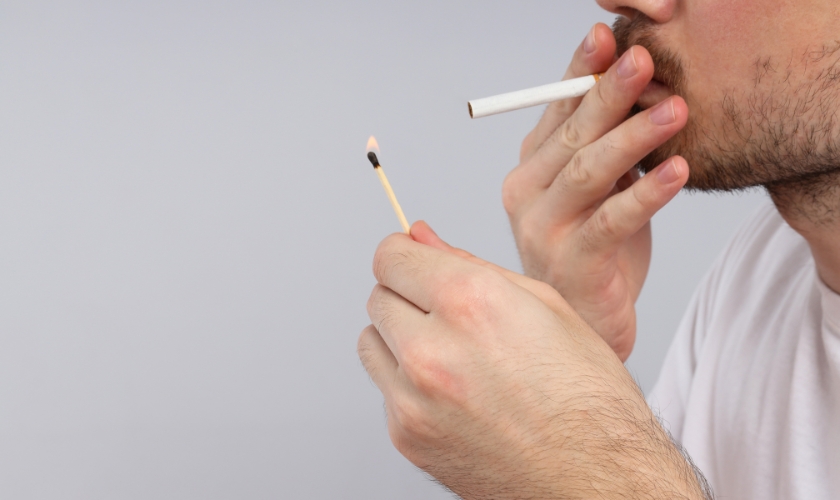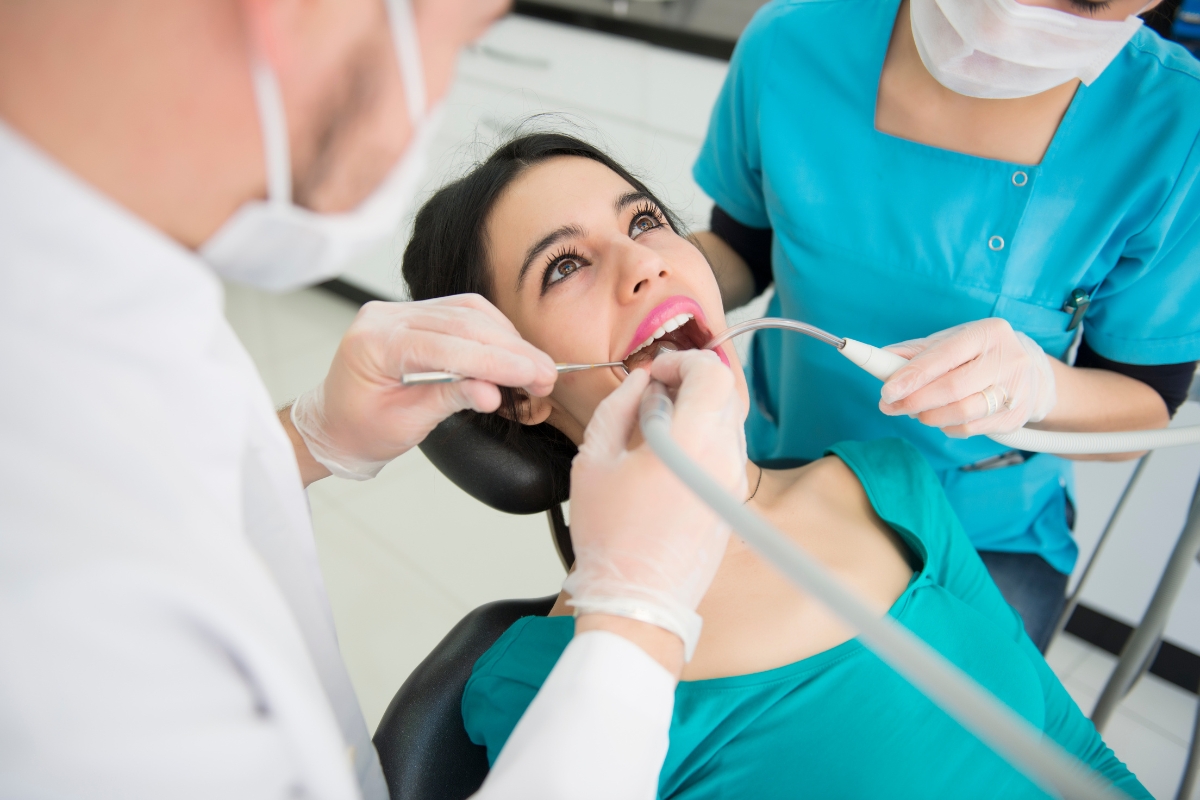Can I Smoke After Tooth Extraction?

So you’ve had a tooth extraction. Maybe it was a wisdom tooth finally saying goodbye or a stubborn cavity that just wouldn’t cooperate. Whatever the reason, tooth extractions are a fairly common dental procedure. But what happens after the dentist numbs the area, wields the tools, and sends you on your way with a gauze-filled grin? Here’s where things can get a little tricky, especially if you smoke after tooth extraction.
The truth is, smoking after a tooth extraction is a big no-no. While the urge to light up might be strong, indulging in this habit can significantly hinder your healing process and open the door to some unpleasant complications. This blog dives deep into the reasons why you should avoid smoking after a tooth extraction, the potential consequences of doing so, and alternative coping mechanisms to get you through the smoke-free period.
Understanding the Healing Process: Why a Blood Clot is Your Best Friend
Following a tooth extraction, a natural blood clot forms in the empty socket where the tooth resides. This clot plays a critical role in healing. It acts as a protective barrier, stopping bleeding and promoting the growth of new bone and tissue.
Think of it like a tiny dam, holding back the tide of bacteria and keeping the wound clean. Now, imagine what happens when you disrupt this delicate dam. That’s precisely what smoking after a tooth extraction does.
The Downside of Smoke: How Smoking Disrupts Healing
Smoking introduces a multitude of problems that can derail your healing journey:
Suction Power:
Inhaling creates a strong suction force in your mouth, which can dislodge the crucial blood clot, exposing raw bone and nerves. This painful condition, known as a dry socket, is something you should strive to avoid when you smoke after tooth extraction.
Reduced Blood Flow:
Smoking constricts blood vessels, limiting the flow of oxygen and essential nutrients to the extraction site. This slows down healing and weakens the body’s natural defense mechanisms against infection.
Impaired Immunity:
The chemicals present in cigarettes and other tobacco products can weaken your immune system, making you more susceptible to infections at the extraction site.
Delayed Healing:
Smoking can significantly delay the healing process, prolonging discomfort and increasing the risk of complications.
In essence, smoking after a tooth extraction is like throwing a wrench into the well-oiled machinery of your body’s healing process.
The Dreaded Dry Socket: Recognizing the Signs
A dry socket, the most common complication associated with smoking after a tooth extraction, is no picnic. Here are the telltale signs to watch out for:
Intense throbbing pain:
This pain typically starts a few days after the extraction and can radiate to the jaw, ear, and even your head.
Unpleasant odor:
The exposed bone can start to decompose, leading to a foul odor emanating from the extraction site.
Visible bone:
In some cases, you might even be able to see the exposed bone in the socket.
Swollen gums:
Inflammation and swelling around the extraction site can also occur if you smoke after tooth extraction. If you experience any of these symptoms, it’s important to consult your dentist immediately. Early intervention is crucial for managing dry sockets and minimizing discomfort.
Beyond Dry Socket: Other Potential Complications
While dry socket is the most well-known complication, smoking after tooth extraction can also lead to:
Infection:
The compromised blood clot and weakened immune system create a breeding ground for bacteria, increasing the risk of infection.
Alveolar osteitis:
This is a more severe form of dry socket that involves inflammation of the bone socket.
Delayed bone growth: The lack of proper blood flow can hinder the formation of new bone in the extraction site.
Impaired taste:
Smoking can temporarily or permanently alter your sense of taste.
Smoking after a tooth extraction is simply not worth the risk of these complications.
Helping You Stay Smoke-Free: Practical Tips and Support
We understand that quitting smoking, even temporarily, can be challenging. Here are some tips to help you navigate the smoke-free period after your tooth extraction:
Plan Ahead:
Discuss your smoking habits with your dentist beforehand. They can provide guidance and support during this crucial time.
Set Realistic Goals:
Don’t try to quit cold turkey if you’re a heavy smoker. Aim for a gradual reduction in the days leading up to your extraction.
Distraction is Key:
Keep your mind and hands occupied with activities you enjoy. Chew on sugar-free gum, read a book, or listen to music.
Nicotine Replacement Therapy (NRT):
Consider using NRT products like patches, gum, or lozenges to manage cravings. However, consult your dentist before using any NRT products.
Seek Support:
Don’t be afraid to confide in friends, family, or a support group for smokers trying to quit. Having a network of encouragement can make a world of difference.
Consider Therapy:
Cognitive-behavioral therapy can equip you with coping mechanisms to manage cravings and withdrawal symptoms.
Reward Yourself:
Celebrate your smoke-free milestones! Treat yourself to something you enjoy, but avoid food or drinks that can irritate the extraction site.
Find Healthy Distractions:
Channel your energy into activities that promote relaxation and well-being. Exercise releases endorphins, natural mood elevators that can combat cravings. Take a walk in nature, listen to calming music, or practice meditation.
Explore New Flavors:
While smoking dulls your sense of taste, a smoke-free mouth is a flavor haven! Experiment with sugar-free candies, mints, or herbal teas to tantalize your taste buds.
Oral Care Up Your Game:
Meticulous oral hygiene is crucial after a tooth extraction. Gentle brushing and flossing (avoiding the extraction site) can keep your mouth clean and fresh, reducing the urge to smoke, which can mask bad breath.
A Smoke-Free Future: The Benefits Extend Beyond Healing
Think of the smoke-free period after your tooth extraction as a springboard for a healthier you. Here are some long-term benefits you can reap by staying smoke-free:
Improved Overall Health:
Smoking cessation reduces the risk of numerous health problems, including heart disease, lung cancer, and stroke.
Enhanced Sense of Taste and Smell:
Your taste buds and olfactory receptors will do a happy dance once they’re free from the numbing effects of smoke.
Brighter Smile:
Smoking stains teeth and contributes to bad breath. Saying goodbye to cigarettes can lead to a whiter, healthier smile.
More Stamina:
Smoking reduces lung capacity, making even simple tasks feel like climbing Mount Everest. Quitting smoking will boost your energy levels and improve your overall fitness.
Financial Savings:
The money you save on cigarettes can be used for things that truly matter, like a well-deserved vacation or a new dental hygiene routine.
Your Partner in Healing
At Carrollton Dentist, we understand the challenges of kicking the smoking habit, especially after a dental procedure. Our team is here to support you throughout your healing journey. We’ll provide clear instructions on post-operative care, answer any questions you have, and offer encouragement to stay smoke-free.
We believe in a holistic approach to dentistry, and that includes prioritizing your overall well-being. If you’re struggling to quit smoking, we can connect you with resources and support systems to help you succeed.
Remember, a smoke-free extraction is a successful extraction. By following these tips and seeking support, you can ensure a smooth healing process and pave the way for a healthier you.
Frequently Asked Questions
Ideally, you should avoid smoking for at least 72 hours (3 days) after a tooth extraction. However, the longer you can abstain, the better.
One puff isn’t likely to cause major problems, but it’s best to avoid it altogether. If you do slip up, contact your dentist for guidance.
Absolutely! Acupuncture, hypnosis, and mindfulness exercises can be helpful tools for managing cravings. Discuss these options with your dentist or healthcare provider.



